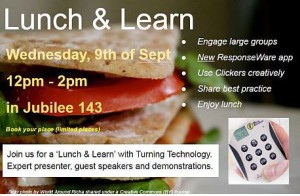
flickr photo by teddy-rised shared under a Creative Commons (BY-NC-ND) license
With large lecture sizes there is always the risk that some students may become disengaged. Bringing interactivity to the lecture setting through the use of mobile student response systems can contribute towards solving this problem and, used effectively, can encourage higher levels of student engagement.
A study by Voelkel and Bennett (2013) from the University of Liverpool highlights the positive effect that the introduction of mobile response system had upon students’ enjoyment, engagement and attendance on four undergraduate modules.
‘Students thought the polls were fun and a good way to break up the lecture and make it more interesting. More importantly, they perceived the phone polls as engaging, making them think and providing feedback on their learning. Survey comments (e.g. ‘They help me to engage with the material rather than passively taking it in’.) indicate an increased level of engagement and interaction in the lectures.’ (Voelkel and Bennett, 2013, p.54)
There is also evidence suggesting that students appreciate the anonymity that these response systems provide, helping those that may otherwise have shied away from speaking up in front of potentially hundreds of their peers. Heaslip, Donovan and Cullen (2013) cite this anonymity as a factor that ‘increases students’ willingness to participate in the class’ with students in their survey commenting that ‘anonymity is great, no fear of humiliation if I get a question wrong’ (Heaslip, Donovan and Cullen, 2013, p.19). Taking away this fear of being seen to answer incorrectly encourages students to respond and engage.
Interactive technologies at Sussex
The University of Sussex has been using clickers for a number of years with around 480 available to hire from IT Services (ITS) and training and support provided by TEL. Recognising the increasing number of mobile devices owned by students, TEL and ITS have over the summer jointly invested in a licence for ResponseWare, an extension to the TurningPoint software. The ResponseWare app  turns students’ mobile devices into clickers allowing them to respond to interactive questions and polls during lectures. Available for free on both Apple and Android devices as well as in web browsers, the ResponseWare app can be used independently from or alongside traditional clicker handsets. This ensures that all students can participate regardless of the number of clickers available or students’ access to mobile devices such as smart phones.
turns students’ mobile devices into clickers allowing them to respond to interactive questions and polls during lectures. Available for free on both Apple and Android devices as well as in web browsers, the ResponseWare app can be used independently from or alongside traditional clicker handsets. This ensures that all students can participate regardless of the number of clickers available or students’ access to mobile devices such as smart phones.
It is important to focus on the fact that personal response systems do not merely have to be used to pose simple polar or multiple choice questions, below are just three ways in which tools such as Responseware and Poll Everywhere can be used.
Informal assessment/Revision
Mobile response systems can be used to regularly assess students’ understanding through the use of informal quizzes or as part of revision sessions. These results allow you to identify areas that need to be recapped or clarified whilst also encouraging students who may have felt that they were alone in struggling with a certain concept.
Peer instruction
In this format a question is posed to students who then have time to think about their answer before discussing with their peers as they attempt to reach a consensus. You could ask students to submit their answers both before and after their short discussion, observing any change in responses. This question type does not necessarily have to have a correct answer and is designed to provoke discussion between students.
Feedback
Giving students the opportunity to provide feedback involves them in the learning process allowing students to actively contribute to the way in which they are taught. In turn this enables tutors to teach in reaction to students’ understandings and needs’ altering aspects of modules as and when necessary.
It is important to recognise the need to create questions at the right level, too easy and students may not feel inclined to answer, however if questions are seen as being too hard students may feel discouraged from responding. Careful consideration must be given to the questions posed and the way in which personal response systems such as ResponseWare are integrated into class in order for students to benefit fully from these valuable tools.
If you would like to find out more about mobile response systems and how you could integrate them into your teaching please contact your school’s learning technologist.
There are a few spaces left at our ‘Lunch and Learn’, Wednesday 9th September, 12-2pm. Come along to learn more about Clickers and ResponseWare and to discover how others are using personal response systems. Book here.




[…] Read the full story by University of Sussex Technology Enhanced Learning Blog […]